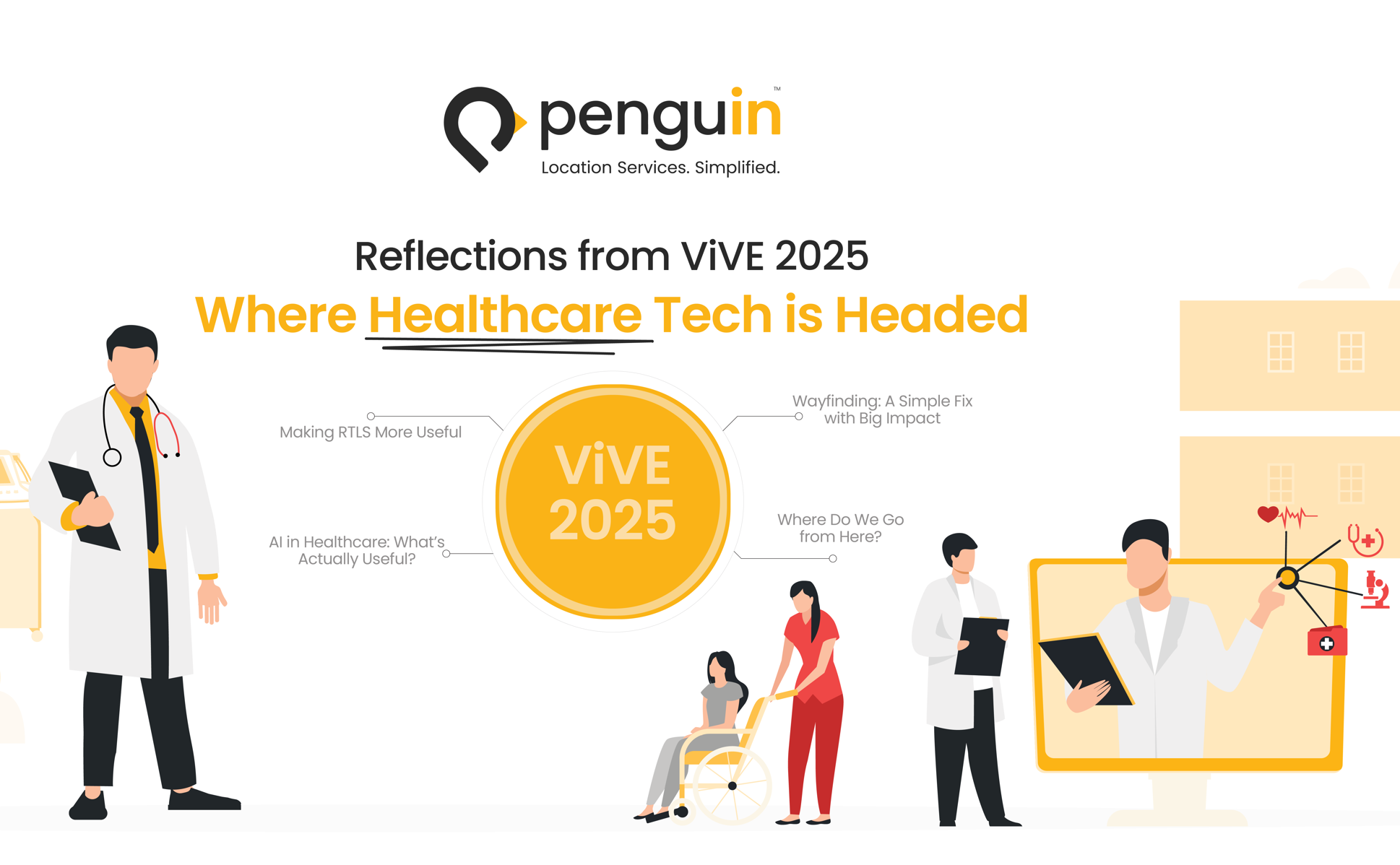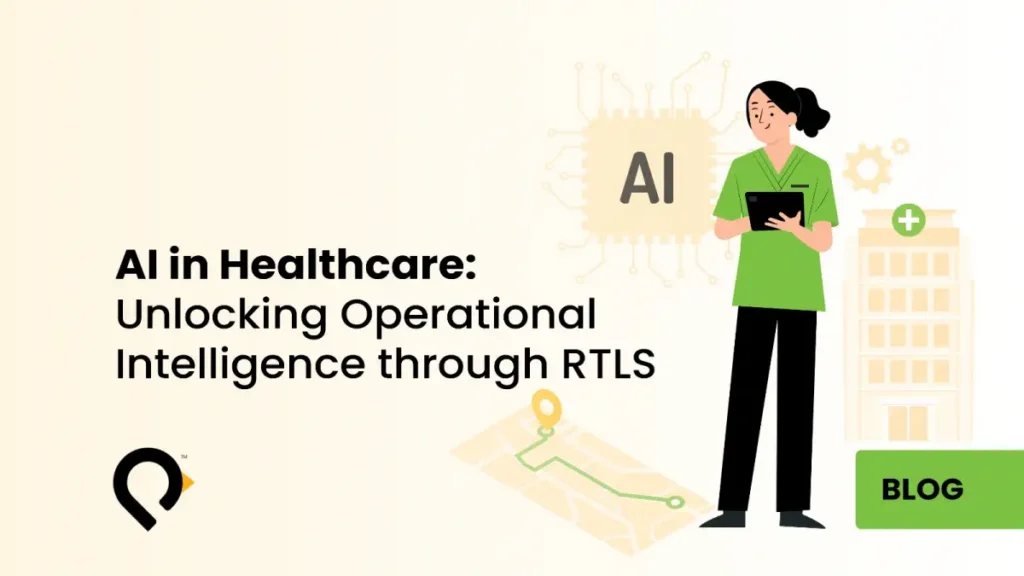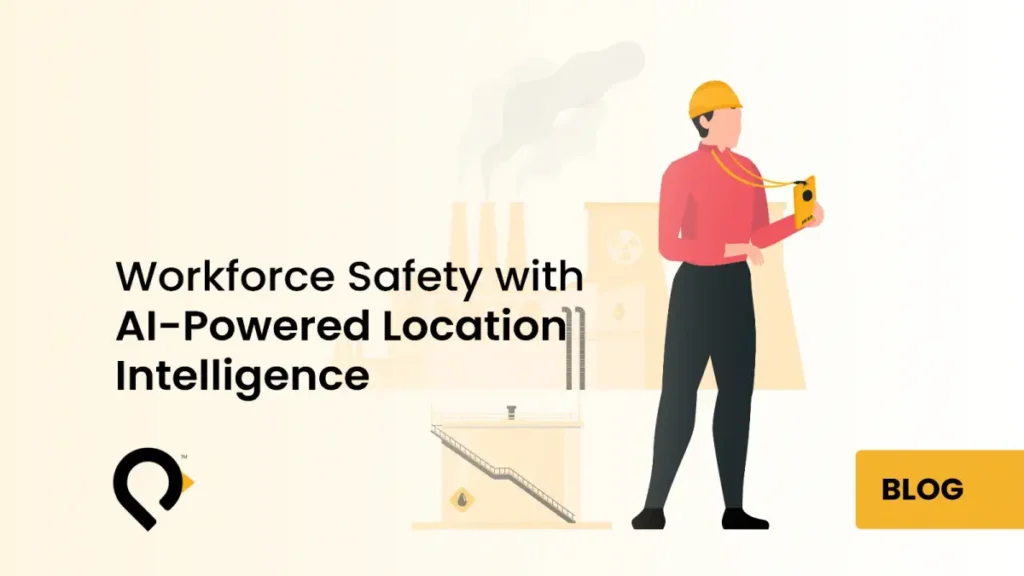
Reflections from ViVE 2025
AI in Healthcare & RTLS Technology: What We Learned at ViVE 2025
ViVE 2025 in Nashville was a great opportunity to step back and think about where healthcare technology is going. Specifically, the conversations around AI in healthcare and RTLS solutions were particularly insightful. The weather may have kept some folks away. However, the conversations that did happen were reinforcing and highlighted key themes shaping the healthcare industry today, especially regarding AI in healthcare adoption.
Making RTLS for Hospitals More Useful
One of the conversations I kept coming back to was around Real-Time Location Systems (RTLS). This healthcare technology has been around for years but is still evolving rapidly. Traditionally, RTLS for hospitals has been all about asset tracking and equipment monitoring. However, more hospitals are now exploring how real-time location tracking can improve efficiency. Additionally, they’re using location intelligence to support staff well-being.
There’s growing interest in using healthcare RTLS data for workflow optimization. It’s not just about knowing where something is anymore. Instead, it’s about understanding how movement patterns impact patient care and hospital operations. Consequently, healthcare facilities can make data-driven decisions that improve outcomes.
That being said, the big challenge remains integration with existing systems. Specifically, connecting with EMR and other healthcare platforms is critical. No hospital wants another healthcare technology system that operates in a silo. There’s a clear push for standardization and interoperability. This makes RTLS solutions easier to adopt without adding complexity to existing workflows.
AI in Healthcare: What’s Actually Useful?
Of course, AI in healthcare was everywhere at ViVE 2025. However, what struck me was how the AI in healthcare conversation has changed significantly. It’s no longer about the broad, futuristic potential of AI in healthcare technology. Instead, people are asking practical questions about AI in healthcare: “Where is this actually helping healthcare today?”
AI in Healthcare for Workforce Support
One area that stood out to me was AI in healthcare’s potential role in workforce support. Specifically, AI in healthcare can help with burnout prevention for healthcare workers. Healthcare is facing serious staffing challenges currently. While AI in healthcare can’t fix everything, it can help spot inefficiencies effectively. Moreover, these inefficiencies identified by AI in healthcare often add unnecessary strain to staff.
There’s considerable interest in using AI in healthcare-driven insights for staff tracking. Especially when AI in healthcare combines with real-time location tracking data, the insights are powerful. Healthcare leaders want to better understand workload distribution and staff movement patterns through AI in healthcare analytics. It’s not about replacing people in healthcare. Instead, it’s about making sure their time is spent where it matters most using AI in healthcare optimization. Ultimately, this AI in healthcare approach improves both staff satisfaction and patient care.
Trust and Transparency in AI in Healthcare
Of course, trust is key for AI in healthcare adoption. AI in healthcare solutions have to be transparent and actually useful. Specifically, they must help people on the front lines. They shouldn’t be just another layer of healthcare data that no one has time to interpret. The future of AI in healthcare depends on practical, actionable solutions that healthcare workers can trust and use effectively.
Hospital Wayfinding: A Simple Fix with Big Impact
One of the more down-to-earth but important conversations I had was about hospital wayfinding. It’s something that often gets overlooked in healthcare technology discussions. However, the reality is clear: large hospitals are hard to navigate. Moreover, that difficulty has real consequences for patient experience.
Missed appointments, lost visitors, frustrated staff—it all adds up quickly. These issues impact both operational efficiency and patient satisfaction scores.
What’s interesting is that indoor navigation is becoming an expectation. It’s no longer just a nice-to-have healthcare amenity. More hospitals are seeing digital wayfinding as part of their overall patient experience strategy. Furthermore, it makes perfect sense from a practical standpoint.
For all the complex problems in healthcare, sometimes a simple fix can have big impact. Specifically, helping people find their way using indoor navigation systems creates immediate value. This healthcare technology improvement is both affordable and highly effective.
Where Do We Go from Here with Healthcare Technology?
What stood out to me most at ViVE was the shift in mindset. The healthcare industry is moving past a critical phase. Specifically, it’s moving beyond adopting healthcare technology just because it’s new and exciting. Now, the focus is on what actually works in real-world healthcare settings. It’s about what delivers clear value to patients, staff, and operations.
As we move forward, I think the biggest opportunities will come from finding balance. Specifically, balancing AI-driven innovation with practical, everyday improvements. These improvements make healthcare work better for everyone involved. There’s tremendous potential ahead for healthcare technology solutions.
I’m looking forward to seeing how these healthcare conversations continue to evolve. The integration of RTLS for hospitals, AI in healthcare, and hospital wayfinding represents just the beginning. More innovation in healthcare technology is coming.
Join the AI in Healthcare Technology Conversation
If you were at ViVE (or just following along), I’d love to hear your thoughts on AI in healthcare trends. What AI in healthcare technology trends are you seeing in your facility? Where do you think AI in healthcare tech is headed next? Specifically, which innovations in real-time location tracking, AI in healthcare analytics, or indoor navigation interest you most?
Share your perspectives on the future of AI in healthcare technology. Let’s continue advancing healthcare together through meaningful AI in healthcare innovation.
About Healthcare Technology Solutions
Penguin Location Services delivers advanced healthcare technology solutions powered by AI in healthcare. Our offerings include RTLS for hospitals, AI in healthcare-powered location intelligence, and indoor navigation systems enhanced by artificial intelligence. We help healthcare facilities improve efficiency, enhance patient experience, and support staff well-being through innovative real-time location tracking technology and AI in healthcare analytics.
Visit: www.penguinin.com




